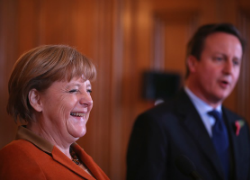In the wake of Prime Minister David Cameron’s call for a voter referendum on Britain’s membership in the EU, new grassroots groups have sprung up supporting a renegotiation of Britain’s EU membership.[1] While Britain considers removing itself from the EU entirely, Germany has emerged as a powerful leader in the EU. Some scholars have gone so far as to say that Germany is “keeping Europe afloat.”[2] What led to Germany’s current power player status is complicated. Whether it be Germany’s rapid economic growth or German Chancellor Angela Merkel’s personality is anyone’s guess.
Now, as Cyprus repeats the Greek meltdown, it has become clearer that the euro zone has not been able to create a “banking union” in any meaningful sense.[3] Developing a true banking union is made more difficult by the fact that Germany continues to oppose creating a euro-wide deposit insurance program.[4]
Despite the Greek bailout in 2010, and the follow-up bailout in 2012 (of which Germany was the biggest contributor of funds[5]), the EU has record-high unemployment.[6] As a result of Germany’s economic influence throughout the EU, it will likely be Merkel who dictates what happens in Cyprus. While Britain was notably absent from discussions surrounding the creation of an EU banking supervisor, Merkel noted that it was “a big step toward more reliability and confidence in the euro zone.”[7] This post explores some of the factors that led to Germany’s strong economic position in the EU and what that could mean for Britain in the future.
German Economic Influence

(Spectator)
Most people in Germany, even down to the standup comedians, believe that Germany is economically dominant because of their “system of apprenticeships” and commitment to building a society that helps entrepreneurs.[8] Germany also overhauled the labor market in an effort to hold down costs.[9] On top of the societal systems, Merkel reminds Germans of Great Britain’s Margaret Thatcher as one who seems to “balance government accounts as though they were a household budget.”[10] The difference, however, is that Thatcher had the British people’s support for doing so, but Merkel has no democratic mandate.[11]
This system has led to Germany being the only country in the EU with the funds necessary to deal with financial crisis.[12] The German economic platform has also given Merkel the power to “dictate the terms under which struggling euro zone nations can apply for further credit, eroding the democratic autonomy of the Greek, Italian and Spanish parliaments.”[13] In 2012, when Merkel approved the second round of bailouts for Greece, she stated: “The risks of turning away from Greece now are incalculable. No one can assess what consequences would arise for the German economy, on Italy, on Spain, the euro zone as a whole and finally for the whole world.”[14] Despite these admonitions, the tide of approval for Greek bailouts was turning.
Various headlines such as “German money is being thrown away on the bankrupt Greeks” bore out a strong current of German criticism.[15] Some posit that Germany continues to do provide bailout funds because of their “self-imposed obligation to help build a Europe where the petty nationalisms that had ruined the continent in two world wars could be definitively overcome.”[16] As stated by Simon Winder, author of Germania: A Personal History of Germans Ancient and Modern: “The tragedy for the Germans is that they viewed the euro as their great, healing gift to the rest of Europe, an act of self-denial in which they cashed in their totemic deutschmark for the continent’s greater good.”[17]
Britain Meanwhile…
Britain continues to extricate itself from the EU and from any sort of indication that they are willing to assist other failing countries. In the face of calls for Britain to leave the EU altogether and with Cameron seeking re-election, he is unlikely to offer any British assistance that will back British taxpayers into a European Union corner that they do not want to be in. Pulling away from the EU at this point has left an opening that Germany’s economy has filled.
Where to From Here? Culture v. Economics
The contrast between the economic strength of Germany and the cultural influence of Britain is stark. While Germany seems devoid of a cultural identity, “Britain is the cultural dynamo of Europe by a million miles.”[18] What kind of actual power British cultural influence can bring to the EU with a fledgling British economic system remains to be seen. What is clear, however, is that the world is looking to Germany for economic answers.
[1] Stephen Castle, British Group Backs Renegotiating E.U. Role, The New York Times, April 22, 2013.
[2] Stuart Jeffries, Is Germany too Powerful for Europe?, The Guardian, March 31, 2013.
[3] Hugo Dixon, A Union That Exists in Name Only, The New York Times, March 31, 2013.
[4] Id.
[5] Louise Armitstead, Germany Approves Greek Bail-out but warns Angela Merkel Against Further Help, The Telegraph, Feb. 27, 2012.
[6] David Jolly, Unemployment in Euro Zone Reaches a Record 12%, The New York Times, April 2, 2013.
[7] Raf Casert and Don Melvin, EU Backs Banking Supervisor, Greece Bailout, Yahoo! News, Dec. 13, 2012, available at http://news.yahoo.com/eu-backs-banking-supervisor-greece-bailout-145720588–finance.html.
[8] Stuart Jeffries, Is Germany too Powerful for Europe?, The Guardian, March 31, 2013.
[9] David Jolly, Unemployment in Euro Zone Reaches a Record 12%, The New York Times, April 2, 2013.
[10] Stuart Jeffries, Is Germany too Powerful for Europe?, The Guardian, March 31, 2013.
[11] Id.
[12] Louise Armitstead, Germany Approves Greek Bail-out but warns Angela Merkel Against Further Help, The Telegraph, Feb. 27, 2012.
[13] Stuart Jeffries, Is Germany too Powerful for Europe?, The Guardian, March 31, 2013.
[14] Louise Armitstead, Germany Approves Greek Bail-out but warns Angela Merkel Against Further Help, The Telegraph, Feb. 27, 2012.
[15] Stuart Jeffries, Is Germany too Powerful for Europe?, The Guardian, March 31, 2013.
[16] Id.
[17] Id.
[18] Id.


